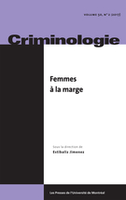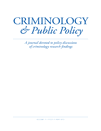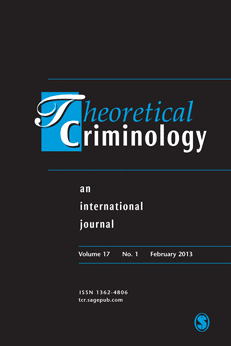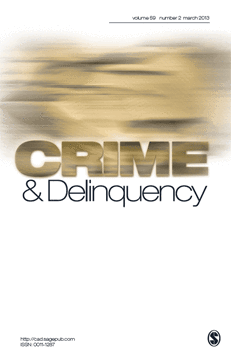
Criminologie
Scope & Guideline
Connecting Theory to Real-World Applications
Introduction
Aims and Scopes
- Interdisciplinary Exploration of Crime and Justice:
The journal emphasizes an interdisciplinary framework, integrating insights from sociology, psychology, geography, and law to enrich criminological analysis. - Focus on Marginalized Populations:
A significant portion of the studies addresses the experiences and challenges faced by marginalized groups, including youth, racial minorities, and LGBTQ+ individuals, highlighting the intersectionality of class, gender, and race. - Geographic Contextualization:
The journal often examines crime and justice through a geographic lens, exploring how spatial dynamics influence criminal behavior and institutional responses. - Innovative Methodologies:
'Criminologie' encourages the use of innovative research methodologies, including qualitative approaches, participatory research, and critical counter-mapping techniques. - Prison and Carceral Studies:
A consistent focus on the prison system and carceral practices, including the experiences of incarcerated individuals and the implications of prison policies on social justice.
Trending and Emerging
- Impact of COVID-19 on Justice Systems:
A surge in studies examining the implications of the COVID-19 pandemic on criminal justice practices, including virtual courts and the experiences of incarcerated individuals, underscores the relevance of health crises in criminological research. - Mental Health and Criminal Justice Intersections:
Increasing attention is being given to the mental health challenges faced by individuals in the criminal justice system, particularly among marginalized populations, highlighting the need for integrated support services. - Geographies of Crime and Punishment:
Emerging research is focused on the spatial analysis of crime, including the role of geography in shaping criminal experiences and institutional responses, reflecting a growing interest in the geographic dimension of criminology. - Youth and Vulnerability in Justice Processes:
There is a notable trend towards exploring the experiences of youth in the justice system, particularly regarding their rights and the impact of socio-economic factors on their interactions with legal institutions. - Restorative Justice Approaches:
An increase in discussions around restorative justice practices indicates a shift towards understanding alternative frameworks for addressing harm and rehabilitation, moving beyond traditional punitive measures.
Declining or Waning
- Traditional Theories of Criminology:
There is a noticeable decline in the publication of papers relying on classical criminological theories, suggesting a shift towards more contemporary and intersectional frameworks. - Generalized Crime Prevention Strategies:
Papers focused on broad crime prevention approaches without specific contextual or demographic considerations are becoming less prominent, indicating a move towards more nuanced and targeted interventions. - Focus on Adult Offenders:
Research centered solely on adult offenders, particularly in isolation from youth and marginalized populations, appears to be waning as the journal increasingly prioritizes the experiences of diverse and vulnerable groups.
Similar Journals

Criminology & Public Policy
Transforming Knowledge into Actionable SolutionsCriminology & Public Policy, published by Wiley, is an esteemed journal that plays a pivotal role in the interdisciplinary fields of law, public administration, and literature. With a focus on innovation and empirical research, this journal addresses critical issues surrounding crime and justice while influencing policy decisions globally. The journal boasts a prestigious impact factor, reflecting its significant contribution to academic discourse, particularly noted for its top quartile rankings in the fields of Law, Literature and Literary Theory, and Public Administration in 2023. As a resource for researchers, practitioners, and policymakers, Criminology & Public Policy aims to bridge the gap between theory and practical application, presenting cutting-edge analyses and insights that are vital for addressing contemporary societal challenges. By providing a platform for rigorous scholarship, this journal supports the advancement of knowledge and fosters informed discussions that shape effective public policies.

CANADIAN JOURNAL OF SOCIOLOGY-CAHIERS CANADIENS DE SOCIOLOGIE
Advancing Sociological Inquiry in CanadaCanadian Journal of Sociology - Cahiers Canadiens de Sociologie (ISSN: 0318-6431, E-ISSN: 0318-6431) is a leading academic journal published by the University of Alberta, dedicated to advancing knowledge in the fields of sociology and political science. With a notable Q2 ranking in these disciplines, the journal provides a vital platform for scholars to share innovative research and theoretical developments. Since its inception in 1977, the journal has witnessed several converged years and has consistently published high-quality articles until its recent volume in 2023, reflecting the evolving landscape of sociological inquiry and discourse. Although it is not an open-access journal, it continues to serve as an important resource for researchers, professionals, and students alike, ensuring that critical societal issues are examined and discussed. The Canadian Journal of Sociology is crucial for fostering a robust scholarly community, enhancing both the understanding of sociological phenomena and the application of sociological thought to real-world challenges.

CANADIAN JOURNAL OF CRIMINOLOGY AND CRIMINAL JUSTICE
Shaping Policies Through Rigorous ScholarshipCanadian Journal of Criminology and Criminal Justice is a premier peer-reviewed journal published by University of Toronto Press Inc., focusing on the vibrant fields of criminology and criminal justice. With an ISSN of 1707-7753 and an E-ISSN of 1911-0219, this journal serves as a key platform for interdisciplinary scholarship that aims to advance understanding and improve practices within the field. As a testament to its impact, it is classified in the Q2 quartile for both Law and Social Sciences (miscellaneous) categories as of 2023, reflecting its esteemed position within academic research, ranked #371 out of 1025 in Social Sciences - Law and #290 out of 604 in Social Sciences - Miscellaneous. Spanning from 2003 to 2024, this journal's content encompasses a wide array of topics and contributes to crucial dialogues concerning crime, justice policies, and societal implications. Though it is not an open access journal, researchers, professionals, and students will find a wealth of knowledge that is instrumental for developing impactful criminological studies and informing policy-making in the Canadian context and beyond. Based in Canada at Journals Division, 5201 Dufferin St, Downsview, Toronto, ON M3H 5T8, it stands as an essential resource for those engaged in criminology and criminal justice research.

Journal of Experimental Criminology
Elevating Experimental Approaches to Crime AnalysisThe Journal of Experimental Criminology, published by Springer, stands as a beacon of innovation within the realm of criminology and legal studies. With an ISSN of 1573-3750 and E-ISSN 1572-8315, this esteemed journal, based in the Netherlands, explores groundbreaking research and experimental approaches to understanding criminal behavior and justice systems. It proudly resides in the elite Q1 quartile of the law category for 2023, ranking an impressive #37 out of 1025 in Scopus within the Social Sciences _ Law domains, placing it in the 96th percentile among its peers. The journal's objectives are aimed at disseminating high-quality empirical research that informs policy and practice, making it an essential resource for scholars, practitioners, and students who strive to enhance the efficacy of crime prevention and criminal justice interventions. With coverage spanning from 2005 to 2024, the Journal of Experimental Criminology invites contributors from diverse backgrounds to engage in the interdisciplinary dialogue that shapes the future of criminological research.

JOURNAL OF CRIMINAL LAW & CRIMINOLOGY
Innovating Perspectives in Criminal Law and CriminologyJournal of Criminal Law & Criminology, published by Northwestern University, is a premier scholarly journal dedicated to advancing the understanding of criminal law and criminological theories. Established in 1974, it has a strong history of publishing rigorous empirical research and critical analyses, contributing significantly to the discourse in legal and criminal justice studies. With an impressive impact factor and recognized as a Q1 journal in Law, it ranks favorably within the Scopus database, positioned in the top 25% of its category. This journal is essential for academics, legal practitioners, and students seeking insightful perspectives and developments in contemporary criminal justice issues. Although not open access, it provides a wealth of resources and discussions, making it an invaluable asset for anyone engaged in the study of law and criminology.

QUEENS LAW JOURNAL
Empowering Legal Minds Through Rigorous ResearchQUEENS LAW JOURNAL is a prestigious legal journal published by Queen's University, Faculty of Law, located in Kingston, Ontario, Canada. With its ISSN 0316-778X, the journal serves as a key platform for academic discourse and research in the field of law, encompassing various disciplines such as criminal law, constitutional law, and international law. Although currently not available as Open Access, the QUEENS LAW JOURNAL maintains a strong reputation for publishing impactful research, making it a vital resource for legal scholars, practitioners, and students alike. By fostering an environment for innovative legal theories and critical analyses, the journal plays an essential role in advancing legal scholarship and promoting informed discussions on pertinent legal issues. Emphasizing quality and rigor, the QUEENS LAW JOURNAL is a valuable addition to any academic library and serves as a trusted reference for those engaged in the legal profession.

CRIME LAW AND SOCIAL CHANGE
Exploring the Nexus of Law and Social TransformationCRIME LAW AND SOCIAL CHANGE, published by SPRINGER, is a distinguished journal that caters to an interdisciplinary audience including researchers, professionals, and students in the fields of law, social sciences, and forensic medicine. With an ISSN of 0925-4994 and an E-ISSN of 1573-0751, this journal is a vital resource for those looking to explore the dynamic interplay between legal frameworks and societal change, particularly in relation to crime and its implications. As of 2023, it holds a commendable Q2 category ranking in Law and Social Sciences and a Q3 ranking in Pathology and Forensic Medicine, showcasing its impact within these vital domains. With its converged publication years from 1991 to 2024, CRIME LAW AND SOCIAL CHANGE is pivotal in advancing scholarly discourse and offering access to high-quality research that informs both policy and practice. Although not an open access journal, it provides valuable insights to its audience through rigorous peer-reviewed articles, making it an indispensable part of the academic literature in its respective fields.

THEORETICAL CRIMINOLOGY
Exploring the Depths of Criminological TheoryTHEORETICAL CRIMINOLOGY is a premier academic journal published by SAGE PUBLICATIONS LTD that serves as a vital platform for the dissemination of cutting-edge research in the realms of law, sociology, and forensic medicine. Established in 1997 and converging into a comprehensive resource through 2024, this journal has achieved a remarkable reputation with a 2023 Q1 ranking in Law as well as in Sociology and Political Science, underscoring its influential contributions to these disciplines. Situated in the United Kingdom, it is recognized for its rigorous peer-reviewed content and holds prestigious positions in Scopus rankings, including Rank #34 in Social Sciences - Law and Rank #38 in Medicine - Pathology and Forensic Medicine, reflecting its commitment to academic excellence. Although it does not currently offer open access options, the journal ensures that its articles are accessible through institutional subscriptions, making it an indispensable resource for researchers, professionals, and students aiming to deepen their understanding of theoretical frameworks and contemporary issues in criminology.

Journal of Criminological Research Policy and Practice
Bridging Theory and Practice in CriminologyJournal of Criminological Research Policy and Practice is a pioneering platform dedicated to the exploration and dissemination of knowledge in the interdisciplinary field of criminology. Published by Emerald Group Publishing Ltd, this journal features high-quality research that addresses contemporary issues and innovative practices in areas such as law, public administration, and social psychology. With an ISSN of 2056-3841 and an E-ISSN of 2056-385X, the journal has garnered a notable presence in the academic community, showcasing a Q3 ranking in Law and Sociology & Political Science as of 2023. The journal provides valuable insights for researchers and practitioners alike, advancing the discourse on criminological policy and its implications for society. It serves as an essential resource for those invested in enhancing social justice, informing policy-making, and understanding the complexities of crime within a broader social context. Encompassing research from 2015 to the present and extending into 2024, the journal stands as a critical reference point for future studies and professional practice in criminology.

CRIME & DELINQUENCY
Pioneering research for a safer society.CRIME & DELINQUENCY, published by SAGE PUBLICATIONS INC, is a premier journal dedicated to advancing the study of criminology and criminal justice. With an esteemed ISSN of 0011-1287 and E-ISSN 1552-387X, this influential journal has been a vital resource since its inception in 1955, continuing to engage in rigorous research and discourse through to 2024. Recognized with a Q1 ranking in both Law and Pathology and Forensic Medicine, CRIME & DELINQUENCY boasts an impressive Scopus ranking, placing it in the top 8% of journals in Social Sciences - Law and the top 31% in Medicine - Pathology and Forensic Medicine. This journal serves as an essential forum for researchers, professionals, and students to explore pressing issues related to crime, delinquency, and their societal implications. Although not an open-access journal, it offers a valuable repository of insightful research and analysis that informs practices and policies within the field. To stay abreast of the latest findings and contribute to the ongoing discourse, CRIME & DELINQUENCY is a must-read for all committed to understanding and addressing criminal behavior in society.